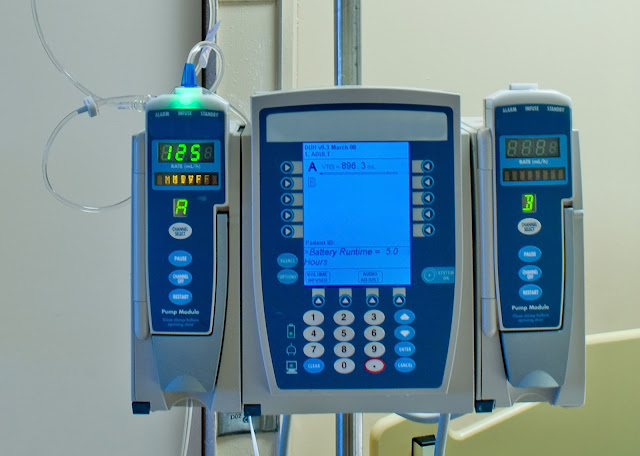Infusion Pumps Are Sophisticated Medical Devices Designed To Deliver Fluids
 |
| Infusion Pumps |
Modern medical equipment called Infusion Pumps are used to distribute fluids. Such as medications, nutrients, or blood products, directly into a patient's bloodstream in a controlled and precise manner. They play a crucial role in various healthcare settings, including hospitals, clinics, and home care, where accurate and continuous delivery of fluids is essential for patient care. The primary function of an infusion pump is to administer fluids at a specific rate and dosage as prescribed by healthcare professionals. This ensures that patients receive the right amount of medication or fluids over a specific period, minimizing the risk of underdosing or overdosing. Infusion pump is particularly valuable when medications need to be administered gradually or when a constant flow rate is necessary. These devices are equipped with various features to ensure safety and accuracy. Most Infusion Pumps have built-in programming options that allow healthcare providers to set specific parameters, such as infusion rate, volume, and duration. This enables personalized treatment plans tailored to each patient's needs.
According To Coherent Market
Insights The Infusion Pumps
Market Was Estimated At US$ 8.87 Billion In 2022 And Is
Anticipated To Grow At A CAGR Of 8.4% From 2023 To 2030 To Reach US$ 16.91
Billion.
Additionally,
Infusion Pumps may incorporate alarm
systems to alert healthcare providers in case of any anomalies, such as
blockages, low battery, or air in the tubing, ensuring prompt intervention. Infusion
pump come in different types, including volumetric pumps, syringe pumps, and
ambulatory pumps. Volumetric pumps, also known as peristaltic pumps, use a
rotating roller mechanism to propel fluids through flexible tubing. They are
commonly used in hospital settings for delivering large volumes of fluids
accurately. Syringe pumps, on the other hand, utilize a syringe mechanism to
deliver fluids in small, precise doses. These pumps are often employed in
critical care units or during anesthesia. Ambulatory pumps are portable devices
designed for patients who require continuous infusion outside the hospital
setting, allowing them to maintain their daily activities while receiving
necessary treatment.
People
with diabetes (both type I and type II) can monitor and control their blood
glucose levels with the aid of Digital Diabetes
Management Devices including
smart insulin pens, smart insulin pumps, smart glucose metres, and continuous
blood glucose monitoring systems.
Advancements
in infusion pump technology have introduced various additional features to
enhance usability and patient safety. Some pumps feature wireless connectivity
and compatibility with electronic medical record systems, enabling seamless
integration into the healthcare workflow. This allows healthcare professionals
to remotely monitor and adjust infusion parameters, reducing the need for
frequent manual intervention. Furthermore, certain pumps incorporate drug
libraries that provide pre-programmed medication dosages and safety limits,
minimizing the risk of medication errors and increasing overall patient safety.
While Infusion Pumps are valuable
tools in patient care, they require proper training and regular maintenance to
ensure optimal performance and prevent adverse events. Healthcare professionals
must be proficient in operating and programming these devices to guarantee
accurate administration and timely troubleshooting. Additionally, regular
maintenance and calibration are necessary to confirm the pumps' accuracy and
functionality.
For
Watching A YouTube Video On Infusion Pumps Click On: Https://Www.Youtube.Com/Watch?V=4VIQY8UleNU
You Can Also Read Press Release: Https://Www.Coherentmarketinsights.Com/Press-Release/Infusion-Pumps-Market-To-Surpass-Us-50-Billion-By-2024-26


Comments
Post a Comment